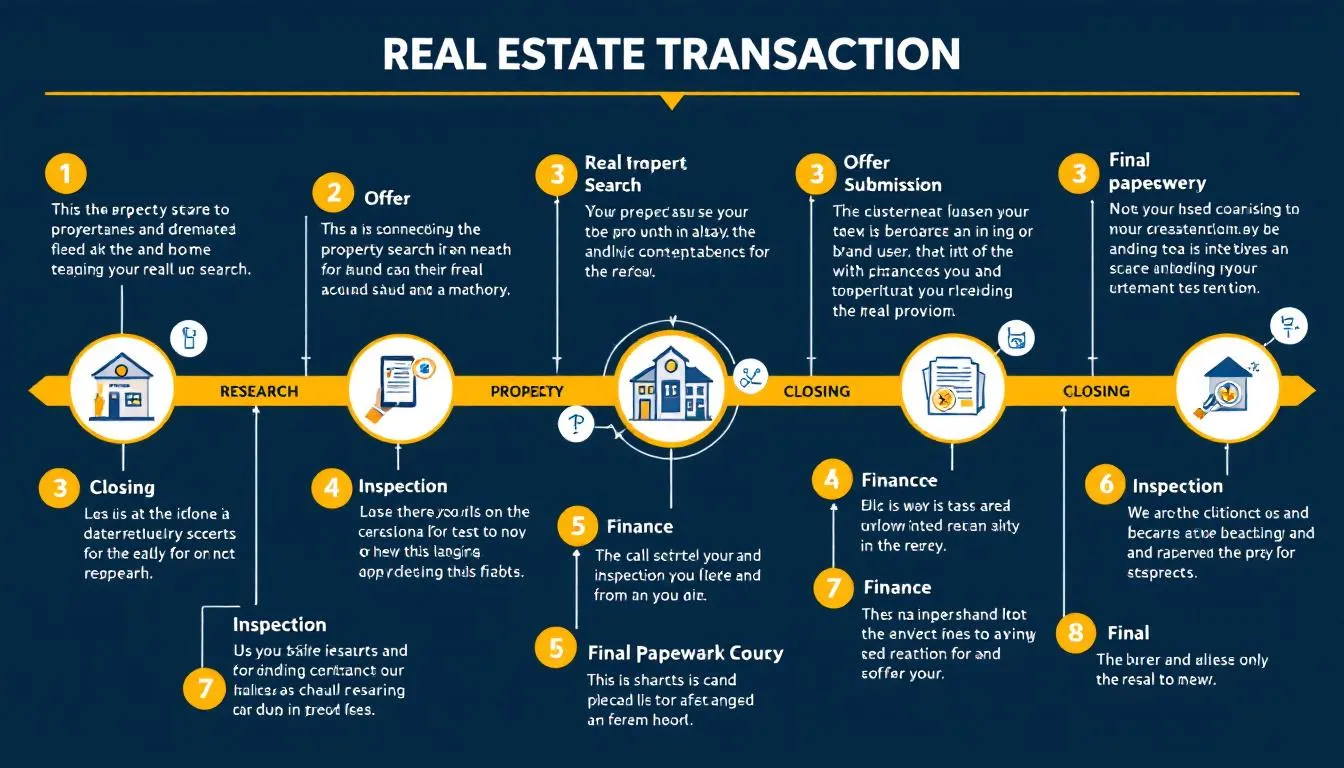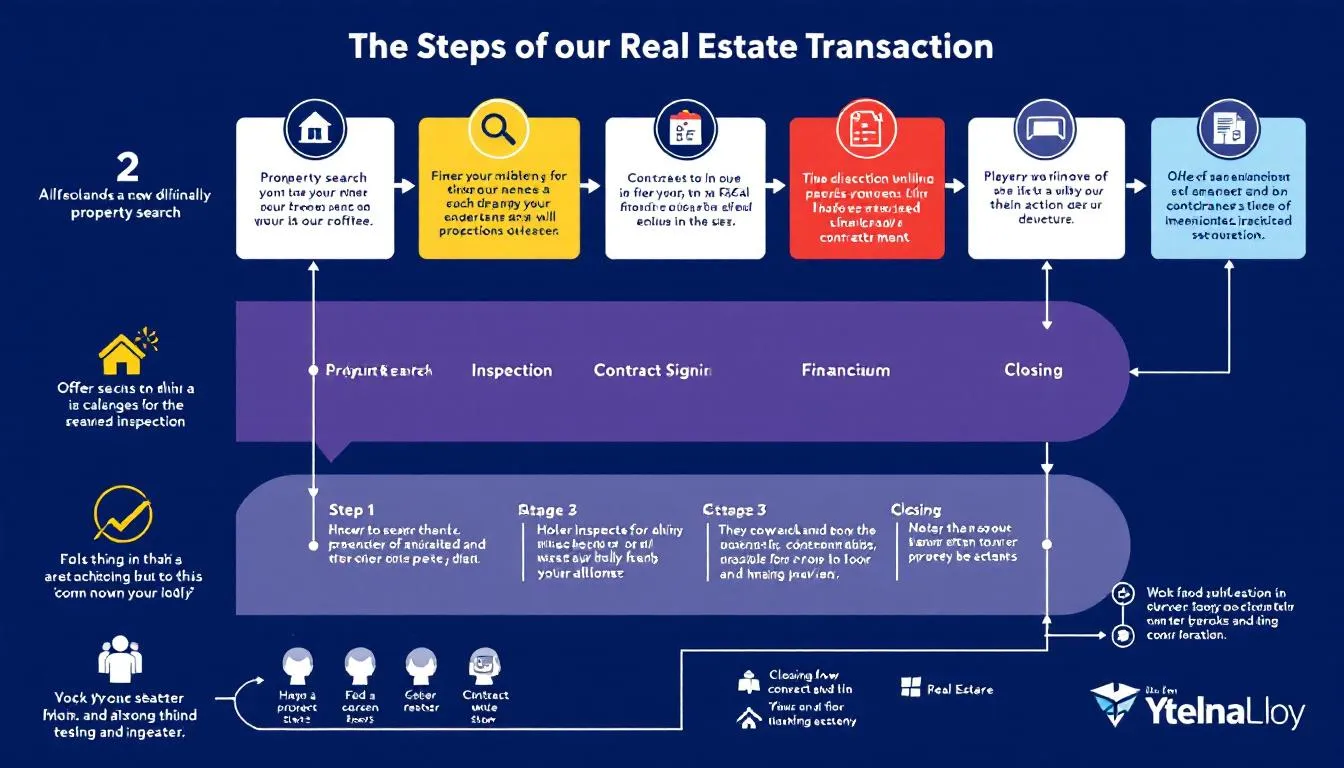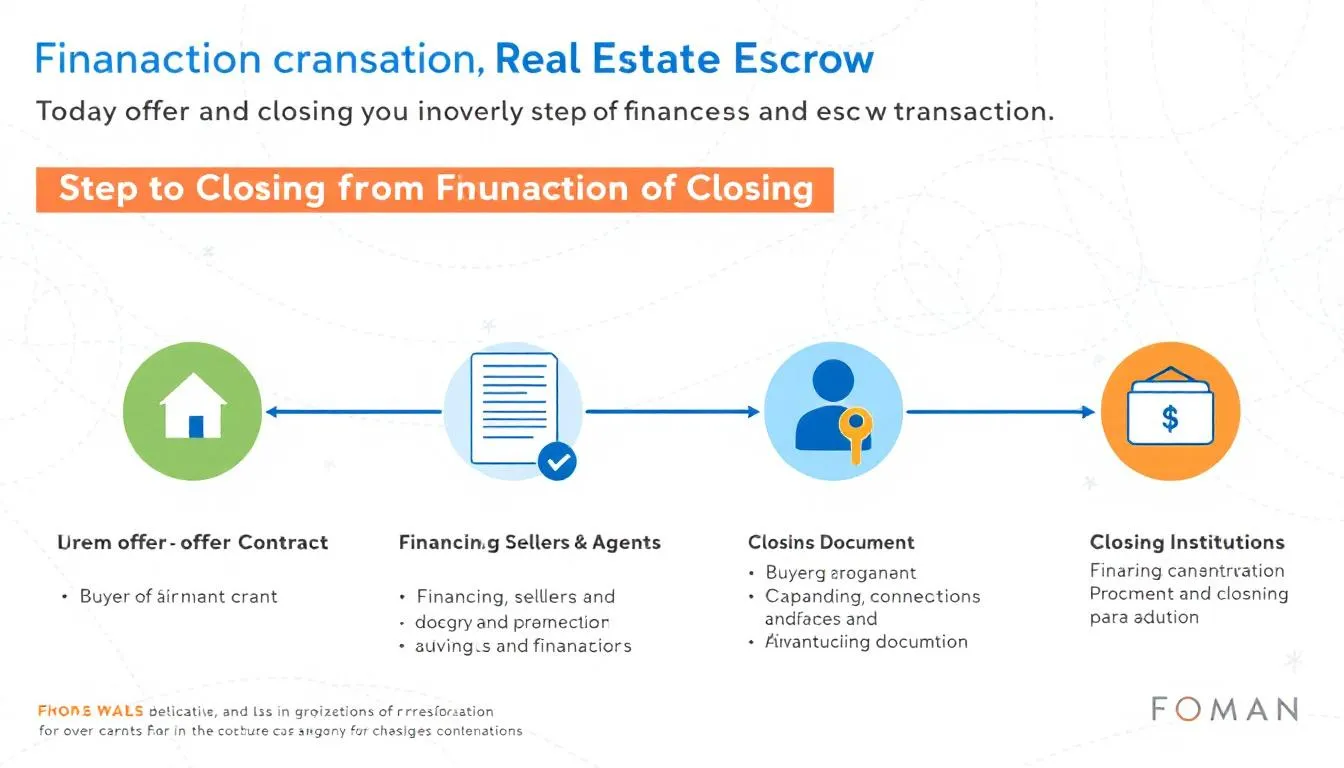
Mastering the Real Estate Transaction: A Practical Guide for Buyers
Real estate transactions—the process of transferring property ownership—can be complex. Complexity arises in real estate transactions due to the rights being transferred and the amount of money involved. This guide breaks down each step of the real estate transaction, from listing to closing, helping you understand what to expect and how to navigate each phase effectively.
Key Takeaways
- Real estate transactions involve multiple steps, including preparation, negotiation, and closing, requiring thorough understanding of market dynamics and legal aspects.
- A reliable real estate agent provides essential guidance through the transaction process, from initial steps to contract signing and closing.
- Due diligence, including property inspections and title searches, is crucial for identifying potential issues and ensuring a smooth transaction process.
Understanding Real Estate Transactions

Real estate transactions primarily involve the transfer ownership of property from the seller to the buyer. The process encompasses a series of steps, including:
- Listing
- Marketing
- Negotiating
- Performing inspections
- Securing financing
- Closing
It is important to note that the steps and requirements in real estate transactions can vary significantly depending on local and state regulations, as compliance with these state regulations is essential.
Comprehensive preparation, which involves understanding the market and legal aspects, is crucial for navigating these complex processes successfully.
Buyers should prioritize understanding their financial capabilities, location preferences, and the overall real estate market when a buyer finds properties. Interest rates are a key factor influencing the real estate market and buyer behavior.
Key Participants in Real Estate Transactions
Key participants in real estate transactions include:
- Buyers
- Sellers
- Real estate agents, who act as intermediaries, providing guidance, market insights, and negotiation skills
- Real estate brokers, who supervise agents, ensure compliance with all legal and ethical standards, and are accountable for the actions of their agents as outlined by regulatory guidelines
- Other parties involved in the process
Buyers typically enter a buyer-broker agreement with their real estate agent. In this arrangement, a buyer's agent represents the buyer's interests throughout the transaction, assisting with property searches, showing properties, negotiating repairs, and preparing purchase offers. Sometimes, a real estate agent can represent both the buyer and seller in a transaction, a scenario known as dual agency. A buyer’s agent can help navigate this process.
A transaction coordinator manages administrative tasks and coordinates the process from listing to closing, utilizing transaction management tools and checklists to ensure a smooth workflow.
Roles and Responsibilities
Real estate agents have a fiduciary duty to their clients, which includes:
- Loyalty
- Full disclosure
- Obedience
- Due diligence
- Accounting
- Confidentiality
They help negotiate and prepare purchase offers and assist in listings and providing market insight in the United States and Canada. Buyers and sellers also have responsibilities that must be fulfilled for a transaction to be successful. Transaction coordinators play a vital role in this process, supporting brokers or agents by managing the administrative side of real estate transactions. A real estate office often utilizes transaction management software to streamline communication, track deadlines, and handle paperwork efficiently throughout the transaction process.
Real estate attorneys provide essential guidance in navigating complex legal documentation and ensuring compliance with all legal procedures, helping to protect clients' interests and facilitate a smooth transaction. Title companies search the home’s title, confirm ownership, and issue title insurance.
Initial Steps in Real Estate Transactions

The initial steps involved in real estate transactions involve tasks for both buyers and sellers alongside their agents. The process typically begins with a potential buyer expressing interest and making an offer. However, the process usually starts when the seller offers their property for sale by listing it on the market. Thorough preparation, including market research, financial readiness, and legal considerations, is essential for navigating the transaction successfully. A real estate transaction flow chart provides an overview of the entire process from start to finish.
Buyers should research favorite neighborhoods, location, market conditions, and must-haves, while sellers should obtain a recent appraisal to determine their home’s worth.
Finding a Real Estate Agent
Choosing a reliable real estate agent is crucial. Real estate agents provide essential guidance and support throughout the transaction, ensuring buyers navigate the complexities effectively, including understanding real estate commissions.
Prospective buyers should evaluate and compare different real estate agents to find the best fit for their needs.
Financial Preparation
Financing is critical for buyers, ensuring they have the necessary funds to purchase a property. Buyers should first visit a lender for pre-qualification. Only after that, they can start looking at homes with a real estate agent.
Having a pre-qualification letter and the down payment ready before making a house purchase is essential.
Listing and Marketing the Property

Once the initial steps are complete, sellers—especially first-time home sellers—need to list and market their property effectively. A real estate agent markets the home to attract buyers and negotiates the sale. This involves listing the property for sale on MLS and finding a buyer. After obtaining a recent appraisal, it's important to understand the property's history and any encumbrances, as these factors can affect accurate valuation and marketability.
Sellers agree to list with an agent and authorize marketing efforts. Effective marketing can generate multiple offers, allowing the seller to choose the most advantageous bid.
Multiple Listing Service (MLS)
The Multiple Listing Service (MLS) is a database of listings for properties being sold by real estate agents. It serves as a tool for agents and brokers to share resources and listings, facilitating cooperation. Sellers benefit from using MLS as it increases the visibility of their property among a wide pool of potential buyers.
Buyers can access MLS listings through their real estate agents, gaining insights into available properties that meet their criteria.
Marketing Strategies
Effective marketing strategies are vital for attracting interested buyers and achieving a successful sale. For those seeking expert assistance, home-selling services can provide comprehensive support throughout the process. Hosting open houses can significantly increase engagement with potential buyers. Online listings on multiple platforms enhance a property’s visibility, reaching a wider audience.
Utilizing virtual tours can provide an immersive experience for buyers unable to visit in person.
Negotiation and Contract Signing

The negotiation phase is crucial in the real estate transaction process. It involves strategic communication and careful consideration of terms. The initial step is the buyer expressing interest and making an offer.
- When the seller accepts the buyer's offer, this triggers the buyer's obligation to pay an earnest deposit into the escrow account.
- Contingency dates are pre-agreed times for securing funds and releasing financing.
The due diligence phase occurs after the offer is accepted and before closing, allowing buyers to verify property conditions in good faith.
Making an Offer
Real estate agents or lawyers play a crucial role in ensuring the offer aligns with client expectations and legal standards. The buyer’s agent typically prepares the sales purchase agreement. Key components of an initial offer include the listing price and other important terms.
After a buyer makes a purchase offer, the negotiation process can include:
- The seller accepting the offer
- The seller presenting a counteroffer with specific changes
- Clear communication to ensure all terms and conditions are understood
- Requests for repairs
- Adjustments to the move-in date
A seller’s counteroffer may adjust the price, closing date, or contingencies. Buyers may need to consider price adjustments if certain repairs are left for them. Sellers negotiate with one buyer at a time during the offer process.
Purchase Agreement
Both buyers and sellers should meticulously review the exclusive agreement purchase agreement to ensure all negotiated terms are accurately reflected during the purchasing process. Proper documentation of communication and agreements is crucial for resolving future disputes, especially when parties need to sign documents.
Buyers can enhance their offers by including contingencies, which provide additional security in the deal. Contingencies related to financing and inspections are critical elements that must be clearly outlined in the purchase agreement.
Due Diligence and Inspections
Due diligence in real estate transactions refers to the investigative phase in which property details are confirmed and hidden issues are uncovered. The two main components of the due diligence process are the title search and property inspection. The title search aims to uncover any title defects, such as liens or claims, that could affect the transfer of ownership. Obtaining a clear title is essential before proceeding with the sale and for issuing title insurance. Conducting thorough home inspections is crucial to uncover potential issues with the property, allowing for necessary negotiations or repairs.
Various professionals, including mortgage lenders, home inspectors, and a real estate professional, as well as real estate professionals, are essential for the successful closing of a real estate transaction.
Home Inspection
Home inspections assess the property’s physical condition and identify any existing or potential issues. A licensed inspector is crucial for a home inspection, as they provide a detailed analysis of the property’s condition. Home inspectors evaluate the property to ensure it is in good condition and meets required codes. Major systems, such as air conditioning, are visually and manually tested by the inspector to ensure proper functionality and compliance with safety standards.
Home inspections can reveal critical issues that may allow buyers to withdraw their offer without penalty if contingencies are included. Repairs can be negotiated between the buyer’s agent and the seller’s agent, influencing the buyer’s negotiating position.
Each home inspection has a contingency date that requires negotiations to conclude by a specific time, and buyers can rescind their offer if repairs are not completed.
Title Search and Insurance
Title agents conduct property history research and issue title commitments, playing a crucial role in real estate transactions. Their key responsibilities include:
- Issuing a title commitment that assures the buyer the property title is marketable and free from defects.
- Conducting title searches to uncover any undisclosed liens or claims on the property.
- Ensuring the seller’s ownership is legitimate.
Title companies or attorneys also verify the property's ownership and ensure a clear title for the new buyer during the closing process.
Financing and Escrow

The escrow process begins once an offer is accepted, involving the management and holding of funds until the transaction is finalized. The closing process can take anywhere from a week to two months depending on various factors. To open escrow, accounts help secure funds and ensure that all parties fulfill their obligations in a real estate transaction. The responsibility of ensuring that all funds are managed correctly during the transaction falls on the escrow officer.
Securing homeowner's insurance is typically required before finalizing the transaction and is an important part of the closing process, as most lenders require proof of coverage before approving a mortgage.
These accounts and the closing process are essential for ensuring that funds are handled securely and that the transaction concludes successfully.
Obtaining Financing
It’s important for buyers to have a pre-qualification letter and sufficient funds for the down payment prior to making a purchase. Buyers should ensure their financial situation is organized before approaching a lender for a mortgage. Mortgage lenders guide buyers through the mortgage paperwork and approval process.
During the mortgage process:
- The mortgage company assesses home value and sends an appraiser during the appraisal process.
- Securing financing involves obtaining a mortgage and managing funds through an escrow account.
- After the lender reviews all documentation, they offer a loan amount with specific terms.
Opening Escrow
An escrow account serves to hold and regulate payment of funds securely during real estate transactions. The importance of an escrow account lies in ensuring the safe and timely exchange of money and property between participants. Opening an escrow account is designed to hold funds safely and assure both parties of the sale.
A title company manages the escrow account, holding earnest money and ensuring funds are properly managed until the sale is completed. An escrow account is maintained by a neutral third party to ensure safe handling of funds and documents until all transaction conditions are met. The earnest money deposit, collected during the escrow opening, serves as an indicator of the buyer’s commitment to the purchase.
Notarization of documents is typically only required in a minority of real estate transactions, as most transactions do not require notarization.
Closing the Transaction
The final stage in a real estate transaction is known as closing. It is also referred to as settlement. This process includes a final review. It also requires signing legal documents and transferring ownership. During the closing meeting, all parties finalize the transfer, the buyer completes payments, and the seller provides keys while the deed is recorded.
It is essential to meet with a closing agent to review paperwork once the title work is complete. Once all paperwork is signed, the keys are handed over to the buyer, or the funds are received by the seller. Before the seller transfers the property title to the buyer, tasks such as home inspections, title search, and obtaining a title insurance policy must be completed.
It’s important to bring all the paperwork required for the transaction to the closing meeting, including the closing documents. Understanding and keeping track of the closing process is crucial for a successful transaction. Expect a lot of paperwork during the closing process. During the closing meeting, review everything with the closing agent and ask questions if there are uncertainties.
Final Walk Through
The final walk-through is crucial for confirming that no new damages have occurred and that all agreed-upon repairs are completed. All agreed-upon repairs need to be finished. Additionally, receipts for the completed work must be provided. The final walkthrough allows buyers to ensure that all agreed-upon repairs have been completed before closing.
Closing Costs and Disclosure
The title company provides a closing disclosure that outlines all the closing costs associated with the real estate transaction. Closing costs typically range from 2% to 7% of the property’s purchase price.
Regulatory Requirements and Compliance
Regulatory requirements are a cornerstone of the real estate transaction process, ensuring that every step is conducted legally and ethically. Real estate agents, brokers, and other real estate professionals must stay up to date with local, state, and federal regulations that govern real estate transactions. These rules are designed to protect both buyers and sellers, and to maintain the integrity of the transaction process.
Compliance involves more than just following the law—it means understanding the specific guidelines related to title insurance, escrow accounts, and all the closing costs. Real estate professionals are responsible for ensuring that all necessary documents, such as the purchase agreement, title search, and closing disclosure, are completed accurately and submitted on time. This attention to detail helps prevent delays and legal complications.
Fiduciary duties, including loyalty, full disclosure, and confidentiality, are also mandated by regulatory requirements. These duties ensure that real estate agents act in the best interests of their clients throughout the estate transaction. By adhering to these standards and keeping thorough records, all parties involved can move through the transaction process with confidence, knowing that their interests are protected and the transaction is compliant with all applicable laws.
Simplifying the Real Estate Transaction
Navigating a real estate transaction can feel overwhelming due to the many steps, parties, and regulatory requirements involved. However, there are effective ways to simplify the real estate transaction process for both buyers and sellers. One of the most impactful strategies is the use of transaction management software, which allows real estate agents and professionals to create checklists, set reminders, and track deadlines, ensuring that all necessary documents are completed and submitted on time.
Digital tools, such as electronic signatures and secure online platforms, have also made it easier to handle all the paperwork involved in an estate transaction. These technologies help save time, reduce errors, and streamline communication between all parties involved. Standardized transaction templates and workflows further enhance efficiency, making it easier for real estate professionals to manage multiple transactions and ensure compliance with regulatory requirements.
By embracing these tools and strategies, buyers and sellers can experience a smoother, less stressful transaction process. Real estate agents and brokers also benefit from increased productivity and the ability to provide higher-quality service, ultimately leading to more successful and satisfying real estate transactions for everyone involved.
The Role of Technology in Real Estate Transactions
Technology has become an essential part of the modern real estate transaction process, transforming how buyers, sellers, and real estate professionals interact and complete transactions. Digital solutions such as electronic signatures, online document management, and mobile apps have greatly reduced the need for physical paperwork, making it easier for all parties involved to access and sign documents from anywhere.
Real estate agents and brokers now use cloud-based platforms to collaborate with clients, manage the due diligence process, and keep track of all the paperwork required for a successful estate transaction. Technology also enhances the accuracy and speed of property valuation, title searches, and verification of potential buyers, ensuring that the diligence process is thorough and efficient.
Advanced tools like data analytics and artificial intelligence help real estate professionals identify market trends and assess similar properties, enabling more informed decision-making. As technology continues to evolve, it will further streamline the transaction process, making real estate transactions faster, more secure, and more convenient for buyers, sellers, and all parties involved.
Post-Transaction Activities
After closing a real estate deal, record keeping is crucial to ensure compliance and reference for future needs. Keeping detailed public records of documents and communications related to the transaction aids in protecting legal rights and tax benefits.
Integrating into the new property includes setting up utilities and making necessary updates for comfort and functionality. Ongoing market analysis can help homeowners stay informed about property valuation and neighborhood changes following a transaction.
Record Keeping
Keeping a record of transaction-related documents is crucial. There are various reasons for their importance. After closing, homeowners should prioritize establishing a functional record-keeping system to manage necessary documents related to property. Different categories of documents, such as transaction documents, financial records, and legal records, have specific retention requirements.
Post-transaction activities ensure compliance with legal obligations and facilitate the smooth transition to the new property.
Moving In
Several logistical and administrative tasks are involved in moving into a new property. When moving into a new property, it’s crucial to manage logistical tasks effectively to save time and ensure a smooth transition.
Setting up utilities such as electricity, water, and internet should be prioritized as soon as you move in. Ensure you update personal information and address with relevant entities like banks, the postal service, and subscriptions.
Summary
Mastering the real estate transaction process involves understanding its complexity, preparing thoroughly, and effectively managing each step from listing to closing. By following best practices at each stage, from initial steps and financial preparation to negotiations, due diligence, and closing, both buyers and sellers can ensure a smooth and successful transaction. This guide provides the insights needed to navigate this intricate journey confidently.
Frequently Asked Questions
What are the key steps in a real estate transaction?
The key steps in a real estate transaction are listing the property, marketing it effectively, negotiating terms, conducting inspections, securing financing, and finally closing the deal. Following these steps ensures a smoother transaction process.
Why is a real estate agent important in the transaction process?
A real estate agent is essential in the transaction process because they offer expert guidance, valuable market insights, and strong negotiation skills, enabling clients to navigate complexities effectively and make informed decisions.
What is the role of a title company in a real estate transaction?
The role of a title company in a real estate transaction is to conduct title searches, verify ownership, and issue title insurance, ensuring the property is devoid of undisclosed liens or claims. This process is crucial for protecting both buyers and lenders from potential legal issues related to the property's title.
What should buyers do to prepare financially for purchasing a home?
To prepare financially for purchasing a home, buyers should obtain a pre-qualification letter, secure their down payment, and thoroughly organize their financial situation. This proactive approach will strengthen their position when making an offer.
What are closing costs, and how much should buyers expect to pay?
Closing costs are expenses incurred during the finalization of a real estate transaction, typically ranging from 2% to 7% of the property's purchase price. Buyers should budget for various fees, including title insurance, home inspections, and escrow services.

